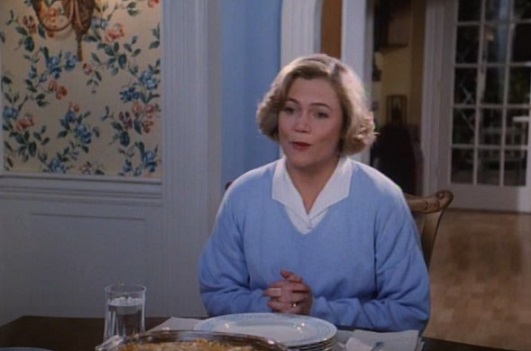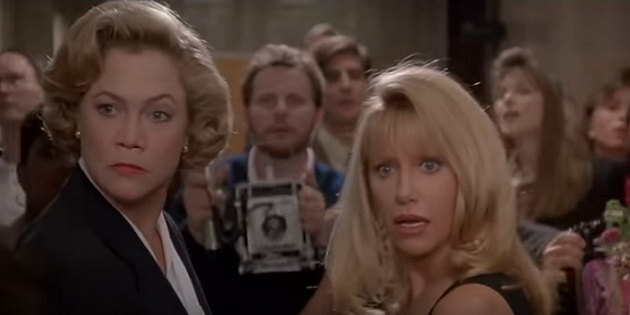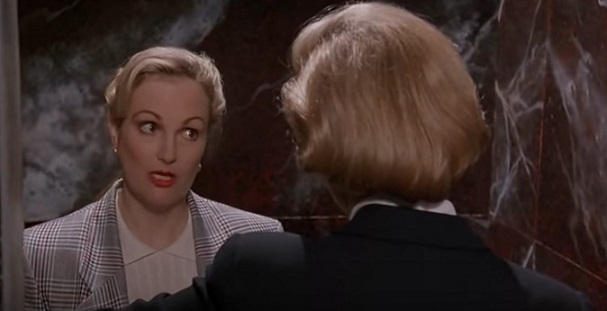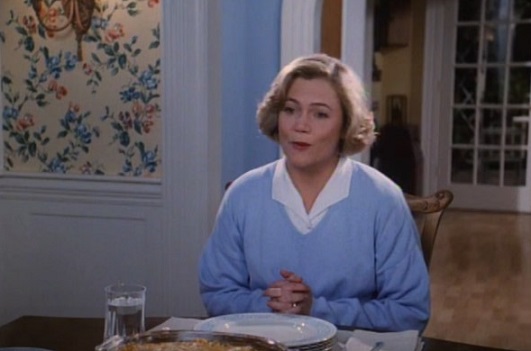
John Waters’ 1994 comedy Serial Mom is one of his most underrated. Though it was gifted with a big budget, glossy cinematography, an in-demand composer, and a big movie star, the film isn’t regarded as Waters’ best. It’s too mainstream to fit into his earlier gonzo oeuvre, but too strange to fit into what Hollywood cinema was doing at the time. Waters wrote a satire about celebrity culture – particularly how criminals find themselves becoming celebrities themselves. Waters -whose filmography is marked by cartoonish violence – also is critiquing horror fandom – but at the same time honoring it and skewering it. All of it. John Waters has a sick sense of humor, but he’s also, at heart, a big ole softie, and he loves his characters.
In Serial Mom, Waters has a new misfit to join his gallery of lovable grotesques. Beverly Sutphin (Kathleen Turner) is an aspirational homemaker who takes care of her family and home with the skill of a drill sergeant in suburban Baltimore (Waters’ favorite locale and hometown). Her husband Eugene (Sam Waterstone) is a well-respected member of his community and a popular dentist, and she has two children: daughter Misty (Waters’ longtime collaborator Riki Lake) and son Chip (Matthew Lillard). Waters does a fantastic in setting up the fiction that the Sutphins are the ideal American family.
So much of Waters work is about souring expectations about decorum and class. He’s much beloved for the filth in his films, so Serial Mom feels like a departure in many ways. It’s filmed with a world-class budget and it shows – unlike his subversive, alternative films of the 1970s (his best work, arguably), Serial Mom has the gloss and sheen of a studio production. The bigger budget simultaneously frees and inhibits Waters because though he has far more resources to tell his story, he also has many more people to answer to. In his latest book, Mr Know-It-All: The Tarnished Wisdom of a Filth Elder, Waters goes into some detail about the making of Serial Mom, in particular detailing the studio’s meddling in the production – specifically in how he treats his lead character. Beverly is an unrepentant serial killer and yet Waters gives her a happy ending of sorts, which worried studio executives. It seems quaint that executives worried that people would leave the theaters with the wrong idea being Beverly prevails, but Hollywood studio executives aren’t necessarily known for their creative courage.
Kathleen Turner: John Waters’ newest superstar

And though Serial Mom is populated by members of his Dreamland cast, it’s Kathleen Turner who makes the biggest impression, though she’s not the first name that would come up when casting a John Waters film. During the 1980s and into the early 1990s, Turner established an accomplished career as a leading lady in a string of well-received films including Body Heat, Romancing the Stone, The War of the Roses, and Prizzi’s Honor. She received an Academy Award for her turn in the supernatural dramedy Peggy Sue Got Married.
Waters’ choice in casting Turner was inspired because the actress’ onscreen persona was sultry, sexy, and seductive. She was the 80s version of Lauren Bacall. She was tall, imposing, with a gorgeously deep and sexy voice (she voiced Jessica Rabbit in Who Framed Roger Rabbit?)
And in 1994 she was still a big star, she was reaching that moment in Hollywood that all actresses have to face when they start looking to “mother” roles or character parts to get work. Turner’s rumoured “difficulty” also got in the way (though Waters wrote that the actress was a trouper), and before long, she would open up about her struggles with rheumatoid arthritis and alcoholism.
So there’s a lot going on with Turner’s casting. She’s an actress who comes into a project with a history. Playing a smiley June Cleaver is a wonderful bit of irony, because she’s anything but. And Turner responds in kind, giving it her all in a hilarious, multi-layered performance that simultaneously mocks the role and commits to it 100%.

As Beverly, Turner has to be convincing as a woman who very nearly can bifurcate her personality. To her children, her friends, and her community, she’s the perfect mother, wife, and homemaker. She’s able to perform these reductive roles with winning aplomb, lulling those around her into a false sense of security and complacency.
But there’s another side to Beverly – a frightening side, one that doesn’t gel with the sunny side. When pushed or threatened – or when her family is hurt or threatened – she responds with violence. Waters purposefully writes an over-the-top character, one who finds the slightest slight to be deserving of harassment and misplaced vengeance.
Turner can play both sides and jumps in with zeal. What helps Waters immensely in directing Turner is her physicality. She’s not only an incredibly beautiful woman, but she’s large. She’s very tall, with broad shoulders and long limbs. She looks like someone who could bash someone’s brains out with a leg of lamb. Some of the most impressive scenes have Turner sprint through the streets with the athletic power of an Olympian.
The plot is a colourful cartoon of mayhem and gore: Whilst maintaining a convincing facade of suburban saintliness, Beverly harbours a deep dark secret: she’s a murderous monster. Her first victim? Chip’s math teacher who suggests his love of horror films is a symptom of deeper psychological issues. When he suggests family therapy, Beverly has enough. She quickly dispatches of him with a vicious bashing with her blue station wagon. When daughter Misty is stood up by her boyfriend, who then steps out on her with a blonde beauty (Waters regular Traci Lords), Beverly harpoons the guy with a fireplace poker.
Longtime Waters muse Mink Stole plays neighbour Dottie Hinkle, a woman who Beverly’s ire by unknowingly (and thoughtlessly) stealing a space in a supermarket parking lot. From then on, Beverly nursed a nasty grudge against her neighbour, calling her with terrible, profanity-laden obscene phone calls (which Turner performs with joyous glee)
Beverly’s placid exterior helps her glide through her community, like a swan, without alerting anyone’s suspicions. It’s only when she kills Misty’s errant beau that things start to fall apart for our serial mom.
When Beverly is arrested for the murders she commits – by the movie’s court scenes, it totals 6 – Waters changes the focus of his film, and it instead becomes a critique on the media’s fixation on criminals. People like O.J. Simpson, the Menendez brothers, Andrew Cunanan, Ted Bundy, Jeffrey Dahmer, Amy Fisher, all became media darlings in the aftermath of their respective crimes. There’s a lurid, prurient zeal to the way media outlets like tabloid TV and trash rags cover these stories. Because Beverly is a beautiful, blond white woman, she becomes a novelty of sorts and a cult hero – one that is misappropriated as a feminist figure, as well. It’s easy to misplace the concept of the feminine mystique at her feet – but nothing in Waters’ script suggests that Beverly felt unfulfilled at home.
Instead, what drives Beverly is her deep-rooted sense of what’s right and what’s wrong. She has a strange, perverted and hyper-aggressive form of morality, and thinks that people who behave boorishly must be punished and deserve to die. The sins of her victims are minor: a teacher who scolds her son; a boy who loses interest in her daughter; a woman who refuses to rewind rented VHS tapes; a couple that eat chicken (she loves birds); a boy who doesn’t buckle his safety belt. These are minor transgressions of social politeness and niceties, but bad form is deadly to Beverly.
During her trial, Beverly becomes a cause célèbre in much the same way that many killers do; she’s embraced by outsiders and misfits as a woman who doesn’t fit it to society’s restrictive notions of wright/wrong/decent. She’s a heroine to those who feel that they don’t belong – a strange situation for Beverly to be in, because she’s nothing like her fans (in reality, if she got to know some of them, she’d probably kill them, too)
True crime and celebrity
Waters captures the early 1990s grisly preoccupation with real crime and murder perfectly. This era was height of tabloid television – the awful trash like Hard Copy gets a shout out – and we see how quickly Beverly goes from social pariah to outlaw hero.
Courtroom drama is not Waters’ forte, and it’s a gratefully short sequence. Far more interesting is the outside world which creates the sick media circus around Beverly’s trial. T-shirts and books are hawked outside the court house. Closing arguments haven’t been given yet, and already a Beverly Sutphin cottage industry has been spawned. Chip – the horror film buff – has taken to managing the family’s media coverage, displaying a savvy to exploit his mother’s ghoulish 15 minutes of fame. There’s even a film planned starring Suzanne Somers as Beverly; to “research” for the role, Somers attends the trial, giving juicy soundbites to the phalanx of reporters during the recesses.

As mentioned before, Waters is very astute and calculating when looking at who he’s casting for his films. As canny a choice as Turner is, the choice of having Suzanne Somers appear is nothing short of brilliant.
Suzanne Somers, known for her role in Three’s Company is a preternaturally good sport about her image. She’s “in” on the joke, and is therefore subverting the classic dumb blonde trope. In Serial Mom, Somers plays a fictional version of herself. Waters understands the baggage that Somers brings into anything that she does post-Three’s Company and heartily exploits it, as does Somers, who remains a criminally underrated light comedienne. On screen, Somers plays with the understood tropes of what “Suzanne Somers” means – ditzy, silly, slightly vapid, and someone who posses meagre talents. She joyfully plays with these cliches – especially in one insane scene in which she recites Beverly’s closing argument, aping Turner’s throaty growl. That Somers somehow manages to twist Beverly’s murder spree into a feminist tale is brilliant. Like Turner, Somers does a brilliant simultaneous act of spoofing/goofing on her role and committing to it.

Aside from Somers, the other small role that needs to be discussed is that of juror #8, who becomes Beverly’s final victim in the film. Patricia Hearst, the Hearst heiress who famously was kidnapped by the Symbionese Liberation Army and was implicated in the group’s criminal activities. Though the image of Hearst – a pretty young woman wearing a beret, holding a machine gun in front of the SLA’s flag – has become iconic to the point of parody, the story is a tragic one of a young woman who was brutally beaten, raped, and tortured.
Though Hearst will never escape the looming shadow of that period in her life, she has found a sympathetic soul in John Waters. It’s not surprising that Waters has reached out to rehabilitate Hearst’s public image. One can just refer to his friendship with Leslie Van Houten, a former member of Charles Manson’s cult. She’s serving two life sentences for her involvement in the La Bianca Murders. Waters has publicly supported Van Houten’s cause, insisting that she deserves to be paroled. Despite parole being recommended 3 times, California governors Jerry Brown and Gavin Newsom overruled the recommendations and denied parole.
So, knowing Hearst’s history, her participation in Serial Mom would seem like a dark choice, especially since much of the media hoopla surrounding Beverly’s crimes parallel much of the hype and hysteria that propelled Hearst into celebritydom. But Hearst joins in the sick fun, playing a juror who commits one of the most egregious sins according to Beverly: wearing white shoes after Labor Day (she would ultimately pay for that faux pas with her life)
Given how prescient Waters’ film is, it’s surprising that it didn’t do well, critically or commercially. Though the film’s legacy has grown since, its initial reception was lukewarm: for many Waters enthusiasts it was far too polished and mainstream. The shaggy guerrilla-style filming of his early is replaced by a smooth, high-gloss sheen; also the social class that is represented is far different from the working class Baltimore that he lovingly portrays in his film. For mainstream comedy fans, Serial Mom is far too subversive and violent – so the film initially failed to find its place. It’s a shame because the film is worth watching, as it combines Waters’ love of camp, his aspirations for Hollywood film making, Turner’s gusto performance, as well as a sharp critique of violence and celebrity culture.

Reblogged this on An American in London.
LikeLike